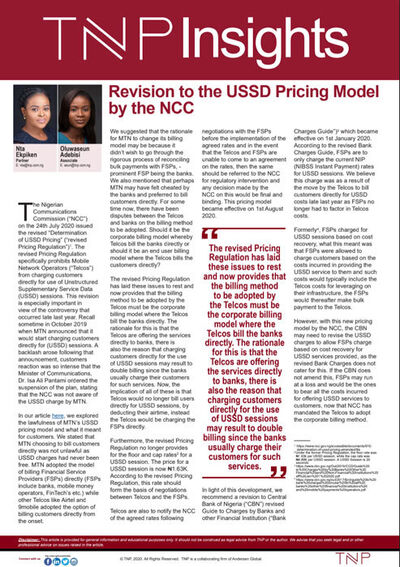The Nigerian Communications Commission (“NCC”) on the 24th July 2020 issued the revised “Determination of USSD Pricing” (“revised Pricing Regulation”)1. The revised Pricing Regulation specifically prohibits Mobile Network Operators (“Telcos”) from charging customers directly for use of Unstructured Supplementary Service Data (USSD) sessions.
This revision is especially important in view of the controversy that occurred late last year. Recall sometime in October 2019 when MTN announced that it would start charging customers directly for (USSD) sessions. A backlash arose following that announcement, customers reaction was so intense that the Minister of Communications, Dr. Isa Ali Pantami ordered the suspension of the plan, stating that the NCC was not aware of the USSD charge by MTN.
In our article here, we explored the lawfulness of MTN’s USSD pricing model and what it meant for customers. We stated that MTN choosing to bill customers directly was not unlawful as USSD charges had never been free. MTN adopted the model of billing Financial Service Providers (FSPs) directly (FSPs include banks, mobile money operators, FinTech’s etc.) while other Telcos like Airtel and 9mobile adopted the option of billing customers directly from the onset.
We suggested that the rationale for MTN to change its billing model may be because it didn’t wish to go through the rigorous process of reconciling bulk payments with FSPs, - prominent FSP being the banks. We also mentioned that perhaps MTN may have felt cheated by the banks and preferred to bill customers directly. For some time now, there have been disputes between the Telcos and banks on the billing method to be adopted. Should it be the corporate billing model whereby Telcos bill the banks directly or should it be an end user billing model where the Telcos bills the customers directly?
The revised Pricing Regulation has laid these issues to rest and now provides that the billing method to be adopted by the Telcos must be the corporate billing model where the Telcos bill the banks directly. The rationale for this is that the Telcos are offering the services directly to banks, there is also the reason that charging customers directly for the use of USSD sessions may result to double billing since the banks usually charge their customers for such services. Now, the implication of all of these is that Telcos would no longer bill users directly for USSD sessions, by deducting their airtime, instead the Telcos would be charging the FSPs directly.



